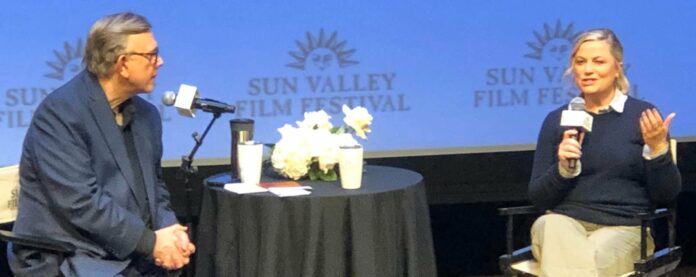
By Ken Stokes
Editor’s Note: With two relatively new, but high-profile events back to back in one not-very-populous state, Wood River Weekly asked contributing columnist Ken Stokes to cover both festivals. As a former Disney entertainment and branding executive, a longtime Valley (Wood River and Treasure) patron of the arts, and a current member of the Boise Philharmonic Board of Directors, Ken has the frame of reference to assess whether Idaho’s newest benchmark festivals are two world-class events or just one big, fun mess. And that means what follows is equal parts—more or less—objective news and personal (but qualified) opinion. Enjoy!
 Spring is here, and that means that a statehouse-full of white male zealots (and the women content to walk two paces behind them) have been very busy ensuring that Idaho returns to the Dark Ages—or, at least to the Inquisition. A woman’s right to make her own health decisions is still under siege, as are civil rights for marginalized communities, but now librarians/censorship, public health regulations, the lawmaking process and the importance of science are on the docket (which is ironic given the emphasis on STEM). And the list goes on. Sure, not all far-right initiatives became law, but there’s always 2023.
Spring is here, and that means that a statehouse-full of white male zealots (and the women content to walk two paces behind them) have been very busy ensuring that Idaho returns to the Dark Ages—or, at least to the Inquisition. A woman’s right to make her own health decisions is still under siege, as are civil rights for marginalized communities, but now librarians/censorship, public health regulations, the lawmaking process and the importance of science are on the docket (which is ironic given the emphasis on STEM). And the list goes on. Sure, not all far-right initiatives became law, but there’s always 2023.
It also marks the re-emergence of two gems (pun intended) on Idaho’s festival calendar—Treefort Music Fest and the Sun Valley Film Festival. That some of the festivals’ programming, subject matter and participants would be in the crosshairs of the legislature’s most controversial proposals is hardly a surprise. Both festivals delivered in spades in terms of artistry and entertainment, but in the area of activism, both need some “work in the woodshed.” After all, the music industry has a proud record of social activism. The film industry, not so much. It has a record of needing to be shamed into developing a conscience. Wouldn’t want to piss anybody off and hurt the gross, but that’ll continue to evolve in the wake of this year’s Oscars.
Diversity of artists, programming and subject matter—a clear priority for both events—is an admirable, albeit passive, tactic to counter the aggressive campaigns of misinformation and willful ignorance employed by the Right. There’s a real opportunity for both festivals to highlight these issues at the tactical level.
Let me pick one bill/issue: H.675 (the so-called ‘trans’ bill) and two events: one at Treefort, one at SVFF to assess the Left’s counterpunch.
Treefort’s Dragfort Drag Brunch at Alefort Lounge—Sunday (12 noon). This was a terrific, intimate event with incredible energy and a great mix of demographics across age and lifestyle. There was a follow-up Queer Talk, which was the final event of Dragfort. But both were comparatively small, it was at the end of the festival, and it was in the dark. How I yearned for the performers to rally the crowd and, reminiscent of Shug Avery in The Color Purple, herd them to a celebration of happiness at a church or the Capitol. So timing is everything. Schedule the event coincident with Sunday Services or when legislators are apt to be at the Capitol. And how about jumping on the trendy drag storyteller bandwagon at Storyfort?
SVFF’s After-Hours Shorts—Friday (10 p.m.). The final short film (11:15 p.m. screening time!) was the provocative “Starf*uckers”—a study of the devastating impact of predatory behavior by Hollywood executives and the exploitation of gay male teens. Beautifully crafted and acted, I only wish the story had been less ‘coastal’ and had been set in, say, a mens’ locker room at Penn State.
The second half of the film is a revenge fantasy with a twist that’s wildly entertaining until it turns heartbreaking (spoiler alert) and the victim drops his coping mechanism of bravura and, wordlessly, communicates the full magnitude of the damage done by people who, to further their own agenda, torment others without any regard for their victims’ humanity. Our legislators should see this film, and the good news is they can expense the ticket price as research.
The disappointing thing is that this was an important film buried in the schedule and competing with festival-sponsored parties that ‘influencers’ were bound to attend. Maybe two-dozen people attended the screening. Sad.
Segue to “The Power of the Dog”—Jane Campion’s celebrated period Western which was nominated for 12 Academy Awards and deals with homosexual self-hatred manifesting as manipulation and bullying, and also has a very surprising revenge twist. Wouldn’t it have been great to have snagged some Power of the Dog filmmakers (after all, the SVFF has a relationship with the New Zealand film industry, which produced Power of the Dog) and turned a midnight showing into a prime-time screening of both the short and the feature with a follow-up discussion billed as one of the festival’s wildly popular Coffee Talks. Hell, it could have been promoted as a benefit for LGBTQ+ filmmakers with premium pricing. It would have been a ‘must see’ with a sold-out house.
My challenge to the event management for both festivals, in 2023, is to find ways to bring ‘into the light’ events which can serve as very visible counterarguments to the most draconian issues under consideration by our state legislators. It will make two beloved events transition from entertainment and toward having an important voice in social responsibility—a meal with two entrées. All without sacrificing any of the fun.


